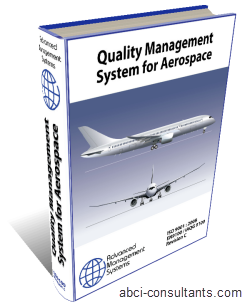
Click here
or call us and be sure to ask our ISO Specialist
how you can get
a copy of our
AS9100 Requirements Guide.
 |
We
Design and Implement Quality Management Systems to Meet the
Requirements of AS9100 Certification, Revision C
Services Available: Documentation, Training, Consulting,
Internal Auditing, RFQ for Certification through an accredited Registrar
This standard AS9100 includes ISO 9001 quality management
system requirements and specifies additional requirements for a
quality management system for the aerospace industry. The additional
aerospace requirements emphasize that the quality management system
requirements specified in this standard AS9100 are complementary
(not alternative) to contractual and applicable law and regulatory
requirements.
This International Standard AS9100 specifies requirements for a
quality management system where an organization a) needs to
demonstrate its ability to consistently provide product that meets
customer and applicable regulatory requirements, and b) aims to
enhance customer satisfaction through the effective application of
the system, including processes for continual improvement of the
system and the assurance of conformity to customer and applicable
regulatory requirements.
AS9100 Revision C Summary of Changes
Clause 1.1 (Scope) ADDITION
Scope extended beyond Aviation & Space to now include Defense
Clause 3 (New Definitions) ADDITION
Risk - an undesirable situation or circumstance that has both a
likelihood of occurring and a potentially negative consequence. (Key
to applying Risk Management)
Special Requirements - Those requirements which have high risks to
being achieved thus, requiring their inclusion in the risk
management process. Factors include:
• Product or Process Complexity
• Past Experience
• Product or Process Maturity
Critical Items - Those items having significant effect on the
product realization and use of the product; including safety,
performance, form, fit, function, producibility, service life, etc.;
that require specific actions to ensure they are adequately managed.
Examples include:
• Safety Critical Items
• Fracture Critical Items
• Mission Critical Items
• Key Characteristics
Clause 4.2.2 (Quality Manual Relationships)
DELETION
Delete requirement to create a document showing the relationship
between AS9100 requirements and the organizations documented
procedures.
NOTE: Auditors need to identify appropriate documented procedures as
an inherent part of the audit
Clauses 5.2 (Customer Focus/Satisfaction) ADDITION
Management responsibility for measuring 'product conformity' and
'on-time delivery' and for taking appropriate remedial actions
Requirement to evaluate customer satisfaction using specific QMS
information, then develop plans that address deficiencies
Clause 7.1.1 (Project Management) ADDITION
New requirement for planning and managing product realization in a
structured and controlled way to meet requirements at acceptable
risk, within resource and schedule constraints.
Clause 7.1.2 (Risk Management) ADDITION
New requirement to implement a risk management process applicable to
the product and organization covering: responsibility, criteria,
mitigation & acceptance
Clause 7.1.3 (Configuration Management) Moved from 4.3
Structured in line with ISO 10007 requirements
Clause 7.1.4 (Work Transfer) Moved from 7.5
The organization must have a process to plan and control the
transfer activities
Expanded to cover permanent transfer
Clause 7.4.1 (Recognition of Supplier Quality Data)
REVISION
Objective and reliable data from external sources may be used during
supplier selection and evaluation
Clause 7.4.3 (Validation of Test Reports) DELETION
Where the organization utilizes test reports to verify
purchased product, the data in those reports shall be acceptable per
applicable specifications. The organization shall periodically
validate test reports for raw material.
Clause 7.5.1.1 (Process Verification) Moved from 8.2.4.2
Requirement to validate the production processes, documentation and
tooling are capable of producing parts and assemblies that meet
requirements. This process shall be repeated when changes occur that
invalidate the original results (e.g. engineering or manufacturing
processes changes).
Clause 8.2.2 (Detailed Tools and Techniques)
DELETION
Redundant to ISO 9001 text, too prescriptive.
Clause 8.2.4 (Sampling Inspection) REVISION
When the organization uses sampling inspection as a means of product
acceptance, the sampling plan shall be justified on the basis of
recognized statistical principles and appropriate for use (i.e.,
matching the sampling plan to the criticality of the product and to
the process capability).
Prior to the adoption of an aerospace specific quality standard,
various corporations typically used ISO 9000 and their own
complementary quality documentation/requirements, such as Boeing's
D1-9000 or the automotive Q standard. This created a patchwork of
competing requirements that were difficult to enforce and/or comply
with. The major American aerospace manufacturers combined their
efforts to create a single, unified quality standard, resulting in
AS9000. Upon the release of AS9000, companies such as Boeing
discontinued use of their previous quality supplements in preference
to compliance to AS9000.
AS9100 was released in October, 1999, by the Society of
Automotive Engineers and the European Association of Aerospace
Industries. AS9100 is a widely adopted and standardized quality
management system for the aerospace industry.
AS9100 replaces the earlier AS9000 and fully incorporates the
entirety of the current version of ISO 9000, while adding additional
requirements relating to quality and safety. Major aerospace
manufacturers and suppliers worldwide require compliance and/or
registration to AS9100 as a condition of doing business with them.
During the rewrite of ISO 9000 for the year 2000 release, the AS
group worked closely with the ISO organization. As the year 2000
revision of ISO 9000 incorporated major organizational and
philosophical changes, AS9000 underwent a rewrite as well. It was
released as AS9100 to the international aerospace industry at the
same time as the new version of ISO 9000. AS9100 Revision C was
released in January, 2009.
The IAQG Sanctioned Aerospace Auditor Transition Training was
released May 1, 2010. The International Aerospace Quality Group
(IAQG) is a cooperative global organization of companies providing
aviation, space and defense products and services. The IAQG is
committed to achieving significant performance improvements through
the development of standards, industry oversight and guidance
materials for use throughout the supply chain.
The IAQG is sponsored by three bodies and three sectors:
- SAE (Society of Automotive Engineers)
- ASD (Aerospace and Defense Industries Association of Europe)
- SJAC (Society of Japanese Aerospace Companies)
- Americas (AAQG) – North, Central & South America
- Europe (EAQG) - Europe, Middle East, Russia & Africa
- Asia-Pacific (APAQG) - Asia and Oceania
|
|


